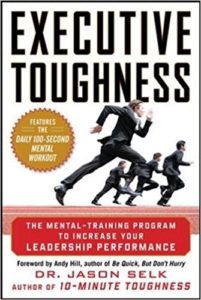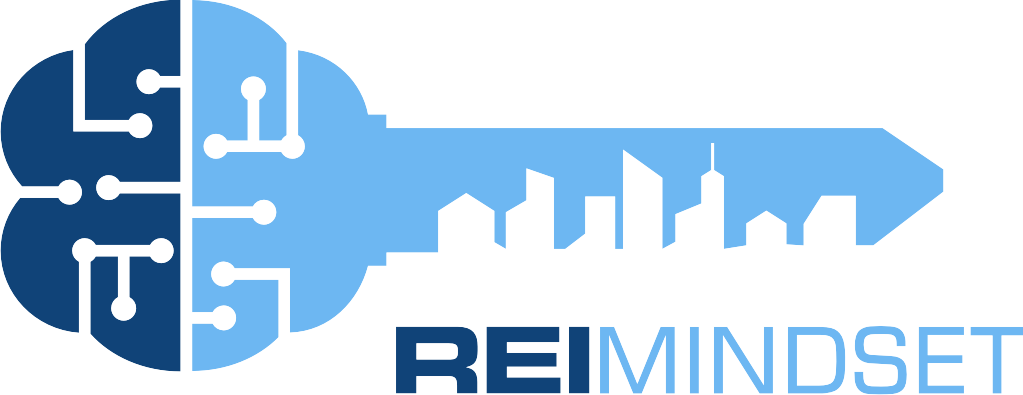
Executive Toughness – The Mental Training Program to Increase Your Leadership Performance
 What is it in life that separates the successful from the unsuccessful?
What is it in life that separates the successful from the unsuccessful?
That questions is one of the most interesting topics in life, to me at least. I believe that one of the answers is mental toughness.
Anyone can develop it in them self, yet few people do.
Physical toughness grows and reduces with our age. Yet mental toughness is something that is attainable at every stage in life.
Life can be, and often is, pretty tough. My fascination psychologically and practically is what makes some people thrive and others give up, quit, and resolve to a life of mediocrity. That question is part of the reason that I started REI Mindset.
I enjoyed this book because the author shares key insights on what it takes to develop mental fortitude and create our own success in the world.
Even during the times when emotion blinds us, we must have the mental toughness to thinking like an executive: big picture, long term, growth mindset, learn from mistakes, make progress, and get it done!
Mental Toughness: ability to keep your mind in control when emotions are out of control.
Lesson 1: Processes get results
This lesson is immensely important and has shifted my thinking forever.
So often we want one particular outcome so badly that it is all we think about. It is great to have those end goals and we will talk about that shortly but there has to first be the realization that most of the time we aren’t the ones that determine what happens.
- Is a lender willing to loan to me?
- Is the buyer going to accept my offer?
- Will these be responsible high quality tenants?
None of these things are in our direct control because there are other moving parts and more importantly other PEOPLE (influencing people is of course another topic discussed heavily on this site). The results are not in our hands but the process to create the highest probability of success is totally and completely in our hands.
- Is my financial presentation package painting the absolutely best picture possible to prove to the lender this is a great deal?
- Did I do my homework and present the strongest offer possible based off of what is likely to be a win/win scenario in the context of market value ($$$) and terms (answering motivated seller’s needs)?
- Did I thoroughly screen these tenants on quantifiable, specific, and measurable indicators of financial responsibility (credit score, proof of income, proof of renter’s insurance) and follow up on their previous landlord references?
Bottom line, we cannot predict with certainty the end result, it is not ours to dictate. What we can control it is our deliberate planning, wholehearted effort, and compelling execution.
Lesson 2: Focus on the priorities only
Focus is our ability to select and concentrate.
Our brain horsepower is limited in supply so we need to prioritize on the things that are the most important tasks.
Remove distractions. We are going to deep dive on this topic in the future with another book called Deep Work by Cal Newport. Anything that doesn’t truly matter to our lives or advance our goals is distracting noise that breaks focus away from the most important tasks.
Email is the great destroyer of productivity. I know because I get several hundred before noon, every day. Being busy is often mistaken from being productive. In real estate there are tons of ways to make money, but many more ways to be distracted. Resist.
Focus on your strengths. Focus on the things that work in your niche that cannot be properly outsourced to another person or systematized to a machine.
If you are the great negotiator on the team, do that and leave the rehab to others.
If you are the great property manager but get nervous asking for money, don’t be the fundraiser if your other partner can do so better.
Yes, you can learn and they are great skill sets, I am not saying to stay in your comfort zone and not grow. I am saying, do the most important work that others cannot. Do it well.
No, do it exceptionally, and be the best at it!
Do the most important task first. Aka, Eat the Frog. Your most important and least pleasant task is the one you should do first in the day because after that, the rest of the day is downhill from there.
It is easy to do the easy things first.
It is easy to do the fast things first.
It is easy to open the inbox get lost in replying to emails then wonder where the day went.
It is hard to do the thing that is actually important. Do the hardest thing first because if you go through the day and keep pushing it back then your willpower will be depleted by the end of the day. Then you will have gone through the entire day avoiding the thing that was supposed to be the most important task to cross off the to do list.
You do have a to do list don’t you? Write it down. Write everything down and prioritize.
Hardest, most difficult, most complex, most essential task on top of the list. Eat the Frog.
Be an optimist. Full disclosure this is something that I struggle with as well. I am not a glass half full person and my previous time as a Military Intelligence officer for the Army has biased me to look at the worst case scenarios (actually worst case and most likely scenarios).
But science backs the claim that winners expect to win.
Winners put in the work (so that success isn’t delusional) then they put all the possible effort into their actions knowing that their preparation, work ethic, and dedication will put them in a scenario where they are likely to win.
That is the mindset of a winner.
That is the mindset of a champion.
That is the mindset of a mentally tough executive.
“Don’t chase the money. Money won’t make you successful. Chase success; that will make you successful” – Jim Steiner, sports agent turned financial adviser for Morgan Stanley
Lesson 3: Disciple will make you successful
Never leave things until you feel like you want to do them.
The human body and the mind is a survival mechanism that doesn’t care about your hopes and dreams. They tag team to make sure that you are alive and avoid anything that feels threatening.
If you leave it to feelings then things don’t get done.
Why do you “feel” afraid when you sign a contract? There is no evolutionary behavior that shaped that feeling while humans were evolving. If that contract works out or doesn’t happen it isn’t like it will somehow end your life. Yet, that feeling survives because our mind perceives a “threat” to our security.
If we just gave into the fear each time there would be no contact signings, there would be no uncomfortable negotiations, and we would quit once we got our first offer rejected.
We want to feel the success but that is only earned through hard fought execution. Be disciplined with your time and actions.
Develop the plan, execute the plan, and refine the plan with feedback.
Manage your own self image. This is the way that you define who you are. This is how you talk to yourself. It is a tool in your kit to motivate yourself but more importantly put perspective into your situation.
- I am a real estate investor. It is a business of houses AND people and I take nothing that happens personally.
- I am the executive of my own company (even a company of one). Executives make hard business decisions but there is great power to this responsibility.
- I am a landlord. I take great pride in providing a safe and secure home to people who have entrusted me with housing them and their families.
Mental toughness, optimism, and discipline are learnable. Yes, perhaps there are people out there who are a bit more naturally gifted in one of those arenas, but that doesn’t mean that you can’t develop these traits yourself.
Your thoughts are your own.
Don’t give yourself permission to be weak.
Be free knowing that you can choose to develop the mindsets, habits, and mental toughness to be successful in the real estate investing world.




Leave a Reply